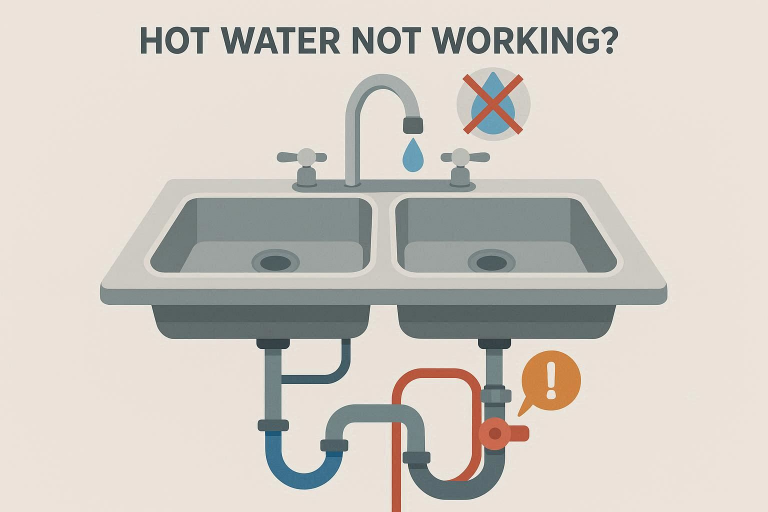It’s a frustrating situation when you turn on your kitchen sink faucet, hoping for a stream of hot water, only to be met with a cold, disappointing trickle. Whether you’re trying to wash dishes, cook a meal, or simply enjoy a warm drink, no hot water in the kitchen sink can quickly disrupt your day. The good news is that this issue is more common than you think and often has simple solutions.
Several factors can cause this problem, ranging from faulty water heaters to plumbing issues like clogs or a broken faucet cartridge. The key is to identify the source of the problem. Sometimes, the issue is as simple as a tripped circuit breaker, while other times, it might require more extensive repairs like clearing a blocked pipe or replacing the water heater.
In this guide, we’ll walk you through the most common causes of no hot water in your kitchen sink and offer practical fixes. With some basic troubleshooting steps, you’ll be able to pinpoint the issue and restore your hot water quickly. Let’s dive into the causes and solutions to get your kitchen sink hot water back in action.
Common Reasons for No Hot Water in Kitchen Sink
When you don’t have hot water in your kitchen sink, it can feel like the whole day is disrupted. Fortunately, there are several common reasons why this happens, and most can be fixed with some basic troubleshooting. Here are the main causes to consider:
Water Heater Malfunction
Your water heater is the main source of hot water, so if it’s malfunctioning, it’s likely the culprit. Common signs of a faulty water heater include no hot water, inconsistent temperatures, or the water becoming cold shortly after it heats up. If your water heater isn’t functioning properly, it won’t supply hot water to your kitchen sink.
Tripped Circuit Breaker or Blown Fuse
If your water heater is electric, a tripped circuit breaker or blown fuse might be the reason why no hot water is coming through. Electrical issues can cut off the power supply to your water heater. A simple way to check is by inspecting your circuit breaker and resetting it if needed. If the breaker trips again, there may be an underlying electrical problem.
Sediment Build-Up in the Water Heater
Over time, minerals and sediments from hard water can accumulate inside your water heater. This build-up affects its efficiency, causing inconsistent water temperature or slow heating. If you hear strange sounds coming from the water heater or notice a delay in hot water delivery, sediment could be the cause.
Faulty or Broken Faucet Cartridge
A malfunctioning faucet cartridge may be the reason hot water isn’t flowing through your kitchen sink. If you notice low water pressure, difficulty turning the faucet, or no hot water coming out, the cartridge might need to be replaced.
Clogged or Blocked Hot Water Line
A clogged hot water line can prevent water from reaching the kitchen sink. Blockages can be caused by mineral buildup or debris, and it’s essential to distinguish this from other plumbing issues, as a blockage can often result in low or no water pressure.
How to Fix No Hot Water from Kitchen Tap?
Check the Water Heater
First, inspect your water heater to rule out any obvious issues.
Steps:
- Check the Thermostat: Ensure it’s set to the correct temperature, typically around 120°F (49°C).
- Check for Leaks: Look around the base of the water heater for signs of leaks.
- Test the Heating Element: If your water heater is electric, the heating element may be faulty. You can test this with a multimeter to check for continuity.
- Reset the Water Heater: Many modern water heaters have a reset button that may help resolve small issues.
Inspect the Circuit Breaker
If your water heater is electric, a tripped circuit breaker may be the culprit. Follow these steps:
- Go to your home’s electrical panel.
- Find the breaker labeled for the water heater.
- If it’s flipped to the “off” position, turn it back on.
- If the breaker keeps tripping, there might be an underlying electrical problem, and you should call an electrician.
Flush the Water Heater to Remove Sediment
Flushing the water heater can help remove sediment buildup, improving its efficiency and restoring hot water flow.
How to Flush Your Water Heater:
- Turn off the power or gas supply to the water heater.
- Attach a hose to the drainage valve at the bottom of the tank.
- Place the other end of the hose in a drainage area or bucket.
- Open the valve to let the sediment and water drain out.
- Close the valve, refill the tank, and turn the water heater back on.
If you’re uncomfortable with this process, it’s best to call a professional plumber.
Replace the Faucet Cartridge
If the issue is with your faucet, replacing the faulty cartridge might solve the problem.
Steps to Replace the Faucet Cartridge:
- Turn off the water supply to the kitchen sink.
- Remove the handle and unscrew the faucet to access the cartridge.
- Remove the old cartridge, and clean out any debris or buildup.
- Install the new cartridge and reassemble the faucet.
- Turn on the water supply and test the faucet.
Be sure to use the correct replacement cartridge for your faucet model.
How Do You Unblock a Hot Water Line?
Identify the Blockage
If you suspect a clogged hot water line, here’s how to identify the problem.
Signs of a Blocked Line:
- No Hot Water: If only hot water is affected, the line could be blocked.
- Inconsistent Temperature: If the water is lukewarm or changes temperature quickly, there may be a blockage.
- Strange Noises: Gurgling or bubbling noises can indicate trapped air or debris in the pipes.
Use a Pipe Descaler or Chemical Cleaner
Chemical pipe descalers or cleaners are effective at breaking down mineral deposits in the pipes.
Steps:
- Choose a descaler safe for your pipes and follow the manufacturer’s instructions.
- Pour the descaler into the affected pipe or plumbing fixture.
- Let it sit for the recommended amount of time, then flush with water.
Mechanical Cleaning Methods
For more stubborn blockages, mechanical methods like plungers or augers may help.
Steps:
- Use a plunger to try to loosen the blockage if the pipe is easily accessible.
- For deeper blockages, use a plumber’s snake or auger to break up the obstruction.
Call a Plumber for Severe Blockages
If the blockage persists or is difficult to reach, calling a plumber is the best option. They have the tools and expertise to clear severe blockages without causing damage to your pipes.
How to Get Hot Water in a Kitchen Sink?
Turn on the Hot Water Tap Fully
Sometimes the problem can be as simple as not fully opening the hot water tap. Check if the tap is completely open and functioning properly.
Check the Hot Water Supply Valve
Ensure that the supply valve for the hot water line is open.
Steps:
- Locate the supply valve under the sink.
- Turn the valve clockwise to open it if it’s closed.
Check for Hot Water Issues in Other Areas
Check if the issue is isolated to the kitchen sink or affecting other faucets in the home. If only the kitchen sink is affected, it’s likely a localized issue. If all faucets are affected, the issue could be with the water heater.
Test the Hot Water Temperature in the Sink
Turn on the hot water and check the temperature. If the water is only lukewarm, the issue might be with the thermostat or capacity of your water heater.
FAQs
Why does my kitchen sink not get hot water?
The most common causes are water heater malfunctions, sediment build-up, or a faulty faucet cartridge.
What to do if the hot water is not working in my kitchen?
Start by checking the water heater, the circuit breaker, and the faucet cartridge. If those are fine, check the hot water lines for blockages.
How can I fix a water heater that’s not heating properly?
Inspect the thermostat, reset the water heater, and flush the tank to remove sediment. If the issue persists, the heating element might need replacement.
Why is the hot water working everywhere except the kitchen sink?
This could be due to a faulty faucet cartridge, a blockage in the hot water line, or sediment buildup in the water heater.
How do I know if my water heater needs to be replaced?
Signs include frequent breakdowns, inconsistent temperature, and the water heater being over 10-15 years old.
When to Call a Professional Plumber
If you’ve tried the troubleshooting steps and the issue persists, it’s time to call a professional plumber. They can handle complex issues like deep blockages, broken pipes, or a malfunctioning water heater. A plumber can also prevent further damage by properly diagnosing and fixing the problem.
Conclusion
Not having hot water in your kitchen sink can be a major inconvenience, but it’s usually a problem that can be fixed with a little troubleshooting. From water heater malfunctions to clogged pipes, we’ve covered the most common causes and solutions for this issue. Regular maintenance of your water heater and plumbing system can help prevent future problems, but don’t hesitate to call a professional if you need assistance.

